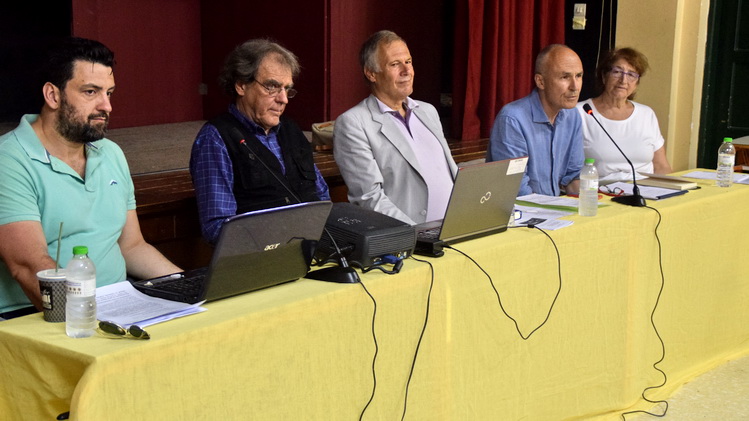At eight o’clock on 14th June in the auditorium of the First Primary School of Aegina an interesting function was held entitled “European Union and the Future”. The aim of the function was to examine present prospects for the European Union and discuss them, following the recent elections. Organized by the Aegina Association of Active Citizens, the function was introduced and moderated by Mr. Stratos Pantavos.
The speakers were William Mallinson, professor in Political Ideas and Institutions at the Guglielmo Marconi University in Italy, the journalist Vasso Kanellopoulou and Nikos Vakolidis, founding member of Greek section of the international defence group for Julian Assange Unity4j.
Stratos Pantavos: Good evening. Thank you HP, the president of the Association of Active Citizens, who launched today’s talks and meeting, on a subject in which the Active Citizens have been very much involved in recent years, the subject of Europe, Greece’s entry into Europe, our relations as citizens with Europe, and the future of Europe, concern about Europe, are something that we have been engaged with for a very long time, starting from what seems distant now, 2008, when we organized the very significant day-conference entitled “Capodistrias Spinelli Europe“, a very powerful function. And subsequently we proceeded, in 2012, with a meeting – right at the height of the crisis, in the dark years of the crisis, on the subject of Philhellenism, and the slogan “We are all Greeks”, and that too met with a strong response at that time. After that we organized another very interesting day-conference. The theme was once again was “Europe: disintegration or a new beginning“. We had invited a very well known and exceptional speaker, Giulietto Chiesa.
Today we are proceeding again with this subject of Europe and the result from the elections, which were held two weeks ago, is very fresh. They were elections which made us all very much afraid that they would mark the disintegration of Europe, but fortunately, we could say, the results were not so catastrophic. Certainly there was a rise of the populists at the European level with the extreme case being Italy, which has become the epicentre of the European populists. But at the same time there was an increase in the Greens and other combinations, both in Germany and in France and what we could say is that the positive element in the whole situation we that for the first time after twenty-five years the percentage of participation in these European elections was over fifty percent. Young people were the big question mark in this case and in the runup to the European elections there was great unease over how far young people would come out because generally they have an attitude of abstention from these processes. We can say that this time young people did go to vote from what has been shown by the various analyses that have been made. And to a great extent in countries like France for example, they gave their vote to the Green movements. Without wanting to say that we are making propaganda for the Greens, they are certainly a counterweight to the promotion of the populists.
In today’s discussion the procedure we will be following is this: we first have to see a video which was made in 2013 with Dastoli, who was the secretary of Spinelli. Spinelli, for those who don’t know, is a man who conceived the European idea and in 1941-42 together with Rossi, when they were political prisoners in Italy, wrote the manifesto for Europe, for free, united Europe. The principles of the manifesto as they were written then, might be said to be valid today. They spoke of a Europe without borders, they spoke of a Europe with a uniform external policy, they spoke of a Europe with a defence policy, a monetary policy, all of these uniform. To what extent these ideas have been realized is another question, but along with some other issues that have been added today, such as those of refugees, and of the environment, which are very important, they are very closely linked to policy, they are once again at the heart of the matters that concern us as European citizens. So we will start with this video with Dastoli, which was made about five years ago, more or less at the time of our function with Giulietto Chiesa, and after that we will have the opportunity to hear our three speakers: William Mallinson, Nikos Vakolidis and Vasso Kanellopoulou, and at the end open discussion.
